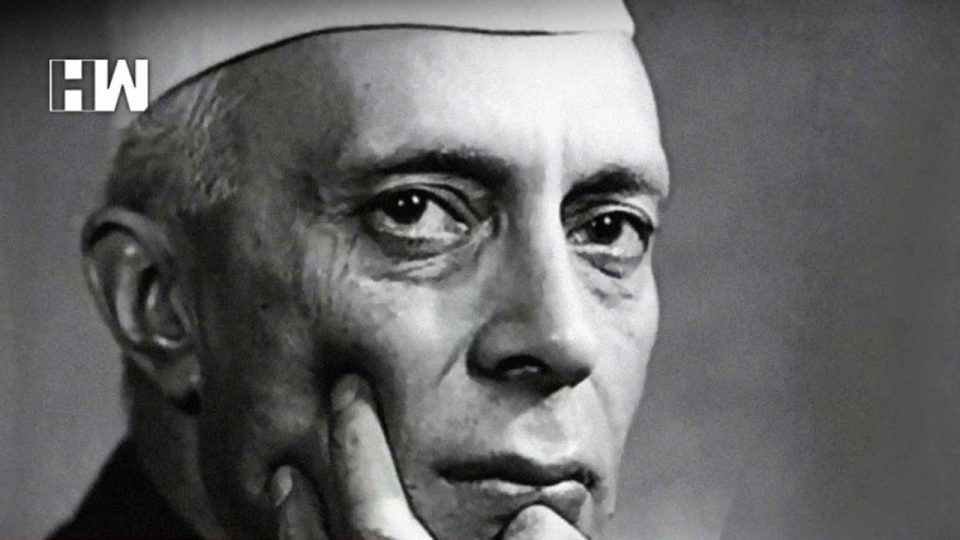Is the contribution of Nehru to India so negligible that it can be obliterated from India’s collective memory?
When I was in school, the Jawaharlal Nehru delineated to me was the suave, progressive first Prime Minister of India who was also loved by children. The Jawaharlal Nehru that is portrayed today is the weak, docile leader who brought India worst fortune. At least that is what the popular media is telling us. It is not surprising though; the hate the first Prime Minister of India is receiving almost 54 years after his death. This streamlined hate towards Nehru has originated from the top, with the current Prime Minister Modi himself repudiating the contributions made by Nehru and the President eluding him from the list of prominent Indians noted in his first speech.
There is so much urgency to erase the legacy of Nehru that the history related to him has been dropped from Class VIII school textbooks in Rajasthan. His name was missing from National Archives exhibition on the Quit India movement. Most recently, the Ministry of Culture has undertaken the task to convert Nehru Memorial Museum and Library at Nehru’s official residence “into a complex showcasing the lives of all Indian prime ministers.” The abhorrence turns even murkier at the bottom of the hate chain.

Such is his tryst with the destiny that the memories of the greatest leader of India as hailed by the Atal Bihari Vajpayee of Bharatiya Janata Party, are the victim of systematic vitriol and abuse nowadays. Methodical efforts are being put by the current government as well to wipe the name of Nehru from public memory and even if one remembers him, should do so on the basis of selective history fed in their mind.
The question, however, remains is Nehru’s contribution to India so negligible that it can be obliterated from India’s collective memory? It may be possible to corrupt the memory of masses to some extent but how would one deny that history will always attribute the edified India to none other than Jawaharlal Nehru?

The times Nehru belonged to were marred by the conflicts. Conflicts between nations, conflicts between communities and even religions. Imagine, not only pulling the country as big as India out of the pit that British had left us in but also bringing economic development; Nehru presided over the task as humongous as this. He founded the future of India belonging to people of different religion, region, language, caste, and creed on scientific temper. Introduced industrialization in a nation where the majority was still working with traditional, outdated systems.
Thus were born the indigenous public sector undertakings like the Bharat Electronics, Bharat Heavy Electricals, Hindustan Aircraft Limited, Hindustan Machine Tools and Indian Telephone Industries. He set up and steered the planning commission which devised a 5-year long plan to put the country again on the development track. Steel plants across the India and Council for Scientific and Industrial Research (CSIR) laboratories were set up.

In a bold move, the first Prime Minister of India proposed to set up the Atomic Energy Commission under the chairmanship of Dr. Homi Bhabha. The Bhabha Atomic Research Centre (BARC) came up in Bombay.
The IITs and IIMs that India takes pride on even today were all envisioned by Jawaharlal Nehru. He had a major role to play in setting up All India Institute of Medical Sciences in Delhi. This was the era in which Research institutes for various disciplines such as electronics, food, Agriculture, pharmacy etc. came up across India.
On an International platform, Nehru emerged as the fiercest advocate of non-aligned countries as a third force during Cold War. The Afro-Asian solidarity founded by him is so strong that even during Prime Minister Modi’s visit to African countries, the heads of the nations did not forget to mention Nehru’s contribution. He built a strong team consisting Sardar Vallabh Bhai Patel and other such stalwarts that eventually planted the seed of development in the Indian soil.

Despite all of this, we cannot ignore the fact that Nehru did commit mistakes that cost India as a nation. Taking Kashmir issue to United Nation was one of them. By taking Kashmir to UN he ensured the wound keeps blistering. Undermining China and waging war against them with an underprepared military led to India’s humiliating defeat. A statesman like Atal Bihari Vajpayee despite being the sternest critic of Nehru respected and even admired the leader. There were differences, in opinions and approach but it never did transcend into visceral hatred. This should be taken as the case study by a lot of leaders today.
While the current government attempts to erase Nehru to validate themselves, lest we forget what Nehru has once said, “You don’t change the course of history by turning the faces of portraits to the wall.”
As an independent media platform, we do not take advertisements from governments and corporate houses. It is you, our readers, who have supported us on our journey to do honest and unbiased journalism. Please contribute, so that we can continue to do the same in future.

